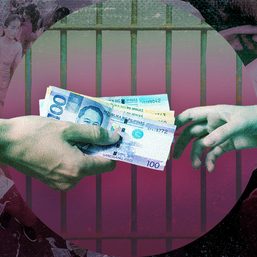SUMMARY
This is AI generated summarization, which may have errors. For context, always refer to the full article.
![[Newspoint] Improbable vote](https://www.rappler.com/tachyon/2023/03/Newspoint-improbable-vote-March-24-2023.jpg)
Precious time for moving on was being lost, I thought, in all the moping over Leni Robredo’s loss to Ferdinand Marcos Jr. in the presidential election nearly a year ago. But, with the Supreme Court finally ordering the Commission on Elections to respond to a petition protesting its count as too fast to be credible, I now wonder.
Presuming the irregularity provable, as the petitioners hold, how, indeed, could the Comelec have counted 20 million votes within an hour of the closing of the voting precincts when preparing for the counting alone normally takes more than an hour?
Records of the proceedings should clear things up anyway. And if those records become inaccessible for some reason, the parallel counts undertaken by the media and other election-watch groups should do as alternative evidence.
But before we begin to get ahead of ourselves, remember the saying that all losers in Philippine elections invariably feel cheated? Actually, that saying is more a commentary on the quality of our elections than a commentary on the character of our losers.
Cheating – not only by fraudulent counting but also by vote buying and voter intimidation – is more or less a given in our elections, thus factored in the calculations – not unlike official corruption. In fact, to an extent election cheating is conceded as an immutable reality in an operating system and culture where patrons and dynasties and their cronies and the rest of the wealthy political class rule and incumbents are thus given a decided advantage.
Two cases are memorable for the principled resoluteness and rare vindication of the protesters – Aquilino Pimentel Jr., the freedom fighter, and his son Aquilino III. Both had been robbed of their duly won senatorial seats, and they had to go through a judicial process so long drawn out it had eaten up most of the term they should have been serving before the certified losers, finally, were physically unseated, making the supposed triumph of justice an absolute joke.
The most memorable case – memorable, that is, for its infamy – features Gloria Arroyo. As vice president to Joseph Estrada, she succeeded him after he had been impeached and forced to step down in midterm before the senate, as the impeachment court, could render its verdict – subsequently in any case, he would be convicted in court, for plunder.
Running for a regular presidential term, in 2004, Arroyo was caught on tape in a phone conversation with the election commissioner she had enlisted in a scheme to rig her own election. She in effect confessed, by apologizing, on national television no less, when confronted with the incontrovertible evidence.
Still, the wrong went unrighted and the crime unpunished, thanks to the quiet acquiescence of an electorate who either could care less or was prejudiced against the type of the cheated candidate – Fernando Poe Jr., a newcomer to electoral politics from the movies. From that default proceeded the corrupt regime of Gloria Arroyo for six more years.
Ferdinand Marcos, dictator by then for 14 years, rigged his own election in 1986. The cheating was exposed by vote encoders themselves, who walked out of their job in protest. Marcos still managed to get himself installed, but the nation would have none of it. Before the month was over Marcos was booted out of power in favor of Cory Aquino, the cheated one, through a mass-protest street vigil now known to the world as People Power and copied by nations fighting for liberation from the likes of Marcos.
For Robredo and her supporters, the fight is being taken up by experts in computerized elections. The Comelec has not complied with the Supreme Court order to respond to them, although it’s been well past the 10 days it was given to do that. The attitude only fits in with the Comelec’s, and also the courts’, lack of a sense of urgency in resolving electoral questions.
What, then, can the petition gain Robredo and her moping voters, realistically? The question, while a valid one, sounds rather defeatist. At issue here, after all, is the reliability of the very validator of our democracy – the free vote. If anything seems amiss here it might have to do with strategy, priorities, focus.
While the slightest undermining of the vote cannot be allowed to slide, the watchdogging for it should be suited to practical and immediately relevant purpose. Getting Marcos out for Robredo may not even look vaguely written in the stars, but the all too credible suspicion that the votes in that case were miscounted and the ample historical evidence that those, and worse, things do happen should be writ large in the nation’s consciousness.
That had better be, with the possibility of an existential issue coming to a vote – a rewriting of the Constitution at the behest of the conspiratorial ruling class. Similar attempts may have been defeated previously, even before a national vote could be taken, but this is not something left to chance under any circumstances, especially since the forces driving the attempt this time seem so desperate they don’t mind resorting to deceit.
For their basic trick, they portray the Constitution to be so inadequate that leaving it alone will spell our economic doom and that, contrariwise, only rewriting it will save us. That’s the considered ruse word – economic. It is intended to give the impression that the rewriting will be limited to the economic provisions. But the real danger is that once the Constitution is opened to tinkering everything in it becomes fair game.
Two reasons alone should decidedly discourage the idea of touching the Constitution at all. First, only 36 years old, the Constitution has not even been given a chance to work its reformist intentions, because the implementing laws needed for that would not pass Congress. Second, that Congress is the exact same house of dynastic patronage and cronyism targeted for reform in the Constitution.
Surprise, surprise! Congress is now the first trumpeter of constitutional change. Well, if any change were to occur with Congress having a hand in it, it could only be a constitutional institutionalizing of the rotten status quo.
The free vote being the last line of defense against that, just try imagining the vote not free. – Rappler.com
Add a comment
How does this make you feel?
![[Newspoint] 19 million reasons](https://www.rappler.com/tachyon/2022/12/Newspoint-19-million-reasons-December-31-2022.jpg?resize=257%2C257&crop=181px%2C0px%2C900px%2C900px)












![[OPINION] Ayungin and why PH should respond as one team, one nation](https://www.rappler.com/tachyon/2024/06/rl-wps-responding-as-one-team.jpg?resize=257%2C257&crop=262px%2C0px%2C720px%2C720px)

![[ANALYSIS] Crisis of the West, opportunity for the rest?](https://www.rappler.com/tachyon/2024/07/20240715-crisis-of-the-west-opportunity-for-the-rest.jpg?resize=257%2C257&crop_strategy=attention)
![[OPINION] Choosing a president](https://www.rappler.com/tachyon/2024/07/Choosing-a-President-July-9-2024.jpg?resize=257%2C257&crop=300px%2C0px%2C1080px%2C1080px)
![[Edgewise] Authoritarian mass delusion puts US democracy at risk](https://www.rappler.com/tachyon/2024/06/authoritarian-mass-delusion-us-june-18-2024.jpg?resize=257%2C257&crop_strategy=attention)

![[In This Economy] Marcos’ POGO ban is popular, but will it work?](https://www.rappler.com/tachyon/2024/07/thought-leaders-marcos-pogo-ban.jpg?resize=257%2C257&crop=255px%2C0px%2C720px%2C720px)
![[Rappler Investigates] POGOs no-go as Typhoon Carina exits](https://www.rappler.com/tachyon/2024/07/newsletter-graphics-carina-pogo.jpg?resize=257%2C257&crop=424px%2C0px%2C1080px%2C1080px)





![[Newspoint] A fighting presence](https://www.rappler.com/tachyon/2024/07/thought-leaders-a-fighting-presence.jpg?resize=257%2C257&crop=441px%2C0px%2C1080px%2C1080px)
![[Closer Look] ‘Join Marcos, avert Duterte’ and the danger of expediency](https://www.rappler.com/tachyon/2024/06/TL-trillanes-duterte-expediency-june-29-2024.jpg?resize=257%2C257&crop_strategy=attention)





There are no comments yet. Add your comment to start the conversation.